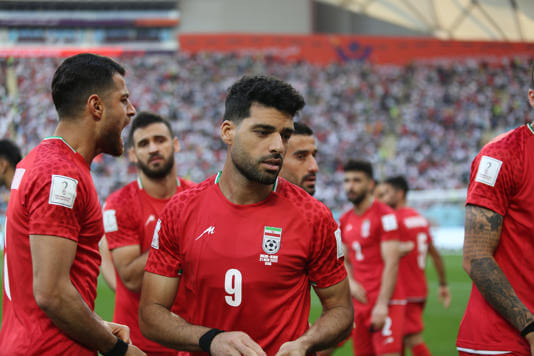The Islamic Republic of Iran was considering an attack on the World Cup in Qatar as it faces increasing pressure at home amid nationwide anti-regime protests, the head of Israel’s military intelligence Chief Maj. General Aharon Haliva said Monday.
Speaking to an audience at the Institute for National Security Studies (INSS) conference in Tel Aviv, Maj. General Haliva described the ongoing protests sweeping through Iran as "extremely exceptional" and said they have transformed into a "civilian rebellion."
Haliva described the death toll and the attacks on national symbols as "very troubling for the regime, especially combined with sanctions, the existing international pressure, and the difficult economic situation."
The protests in Iran began after the death of 22-year-old Mahsa Amini, an Iranian woman who was arrested and brutally killed by the Islamic morality police in Tehran in September for her hijab wear.
In response to the protests, the Islamic government has deployed security forces, Revolutionary Guards Corps (IRGC) troops, and members of the Basij paramilitary forces to arrest, beat, and kill Iranian civilians on the streets.
According to the Norwegian-based group Iran Human Rights, around 400 people have died, with half a dozen sentenced to death and more than several thousand arrested. Others estimate up to 15,000 have been arrested and may face the death penalty.
Haliva further explained that there is a "real concern within the regime that it endangers the regime."
The Israeli official said that he does not "see a risk to the regime," but as "the pressure on Iran increases, including internal pressure, the Iranian response is much more aggressive, so we should expect much more aggressive responses in the region and the world."
"I am telling you that the Iranians are now considering attacking the World Cup in Qatar as well," he said. "The only thing holding them back is how the Qataris will react."
Haliva's comments came as outgoing Israeli Defense Minister Benny Gantz warned that Iran is liable to attack the World Cup to cause regional instability.
"Iran is seeking to preserve instability as a constant thing. At a time when the world around, it is stable and thriving - this is the opposite of what is happening inside Iran," Gantz said. According to Gantz, the World Cup is "likely to be one of those events at which it tries to cause instability."
"Iran is on the whole field, from nuclear to riots," said Haliva, using soccer terms as the World Cup started over the weekend. The intelligence official explained that the Islamic Republic has ramped up its offensive action in the past year, noting the recent drone attack on an Israeli-owned oil tanker off the coast of Oman. Since 2022, the Israeli government has counted cyberattacks around 100 operations conducted by Iran, according to Haliva.
"In London, they are preparing for an Iranian attack, and they know what they are talking about. The US is preparing for Iranian terror. I am not convinced that the [rest of the] world understands the power that the Iranians bring to the global level," he said.
Haliva also explained Iran's fingerprints in the Palestinian arena, noting that the Islamic Republic spends lavishly to support groups like Hamas and Palestinian Islamic Jihad to attack Israeli troops and civilians. Regarding the stalled nuclear talks, Haliva said that Tehran has made "significant progress" toward 90 percent enriched uranium.
"I wonder what the international community will do when Iran starts enrichment at 90 percent," he said. The intelligence chief said that having America's support should Israel attack Iran's nuclear facilities would be the best. On the issue of whether or not Israel's Arab allies would aid the Israeli military in striking Iran, Haliva had doubts as to whether such actions would occur.
"The Abraham Accords intensified [Iran’s] sense of [regional] suffocation. This is a great thing and I hope they would be expanded. But in the end, there is an understanding that we are the regional power, and it is not worth depending on these countries to be by our side on the day of action against the Iranians, because I estimate this will not happen," he said.
With ongoing protests occurring in Iran and Western governments halting nuclear agreements as of now, the mullahs in Iran continue to lash out against the West, Israel, and Arab nations, accusing them of supporting the protests.









